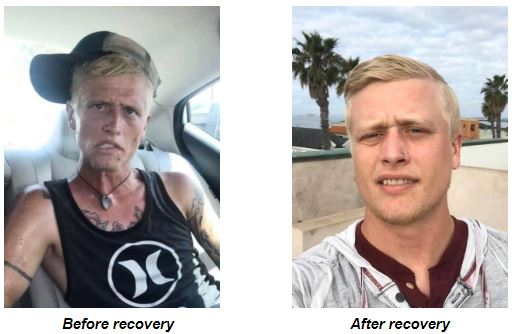Get personalized support for heroin addiction
Heroin Addiction Before and After
Heroin is a highly addictive drug that takes a devastating toll on the body and mind. Its effects can be seen in dramatic before-and-after images of individuals struggling with addiction. While physical damage is evident, heroin also impacts mental health, relationships, and overall well-being. However, recovery is possible, and many people regain control of their lives after addiction.
Heroin before and after pictures


How heroin affects the body
Heroin is a powerful opioid that impacts nearly every system in the body. While the short-term effects may create a sense of euphoria, the long-term damage can be severe and, in some cases, irreversible.
Short-term effects of heroin use
When heroin enters the body, it quickly binds to opioid receptors in the brain, producing immediate effects such as:
- Clouded thinking: Heroin affects cognitive function, leading to poor decision-making and confusion.
- Euphoria and relaxation: A surge of dopamine creates intense pleasure and drowsiness.
- Slowed breathing: Heroin suppresses respiratory function, increasing the risk of overdose.
- Nausea and vomiting: Many users experience stomach pain and discomfort.
- Itching and flushed skin: A common reaction due to histamine release.
Long-term effects of heroin use
Prolonged heroin use leads to serious health complications, including:
- Hormonal imbalances: Heroin disrupts natural hormone production, leading to sexual dysfunction and irregular menstrual cycles.
- Liver and kidney disease: Heroin puts strain on vital organs, increasing the risk of failure.
- Collapsed veins and infections: Frequent injections damage veins and can cause abscesses and infections.
- Heart problems: Heroin use is linked to an increased risk of heart infections and cardiovascular disease.
- Weakened immune system: Chronic heroin use makes the body more susceptible to infections and diseases.
Facial spots and skin sores


Why heroin users develop facial spots and sores
- Toxins in heroin: Heroin is often mixed with harmful additives that accumulate in the body, irritating the skin and causing breakouts, rashes, and facial spots.
- Skin picking (excoriation disorder): Heroin use can trigger obsessive skin picking due to hallucinations of bugs crawling under the skin (formication), leading to raw wounds, infections, and scarring.
- Poor circulation: Heroin constricts blood vessels, reducing oxygen flow to the skin. This slows healing, making even small blemishes turn into long-lasting sores.
- Weakened immune system: Chronic heroin use weakens the body’s ability to fight infections, causing wounds to heal slowly and increasing the risk of bacterial infections.
Skin abscesses

How heroin causes abscesses and infections
- Injection site infections: Repeated injections damage the skin and veins, creating open wounds that become breeding grounds for bacteria. Poor needle hygiene further increases infection risk.
- Collapsed veins and tissue death: Long-term heroin use can cause veins to collapse, cutting off blood flow to surrounding tissue, leading to skin necrosis (tissue death) and painful abscesses.
- Sharing needles: Many heroin users share needles, exposing themselves to infections such as staph, MRSA, and hepatitis C, which contribute to severe skin complications.
Online Heroin Rehab
Our Online Heroin Recovery Program helps you stay sober with flexible, private support tailored to your needs. Access therapy, peer groups, and relapse prevention strategies from anywhere.
Can the changes from heroin be reversed?
Heroin takes a severe toll on the body and mind, but recovery is possible. The extent to which the body can heal depends on the duration and severity of use, overall health, and access to treatment. While some damage can be repaired, other effects may be long-lasting or permanent.
What can improve after quitting heroin?
With sobriety, medical care, and a healthy lifestyle, many changes caused by heroin use can be reversed, including:
- Skin and physical appearance: Sores, abscesses, and infections heal over time with proper medical treatment and hygiene. Weight can stabilize with improved nutrition.
- Brain function and mental health: Cognitive abilities like memory and focus often improve. Therapy and time in recovery help regulate emotions and reduce anxiety and depression.
- Organ function: The liver and kidneys may recover if the damage isn’t severe.
- Energy levels and sleep patterns: The body gradually restores natural sleep cycles, leading to better rest and higher energy.
What may be permanent?
Some effects of heroin use may not fully reverse, especially in cases of long-term addiction. These include:
- Heart and lung issues: Damage to the cardiovascular and respiratory systems may require ongoing medical management.
- Severe dental damage: Tooth decay and gum disease may require extensive dental procedures or tooth replacement.
- Collapsed veins and scarring: Long-term injection use can cause permanent vein damage and visible scarring.
- Chronic mental health conditions: Some individuals may experience persistent anxiety, depression, or cognitive decline even after quitting.
What can improve after quitting heroin?
With sobriety, medical care, and a healthy lifestyle, many changes caused by heroin use can be reversed, including:
- Skin and physical appearance: Sores, abscesses, and infections heal over time with proper medical treatment and hygiene. Weight can stabilize with improved nutrition.
- Brain function and mental health: Cognitive abilities like memory and focus often improve. Therapy and time in recovery help regulate emotions and reduce anxiety and depression.
- Organ function: The liver and kidneys may recover if the damage isn’t severe.
- Energy levels and sleep patterns: The body gradually restores natural sleep cycles, leading to better rest and higher energy.
Get started on your journey to recovery today
SEND US A MESSAGE
"*" indicates required fields